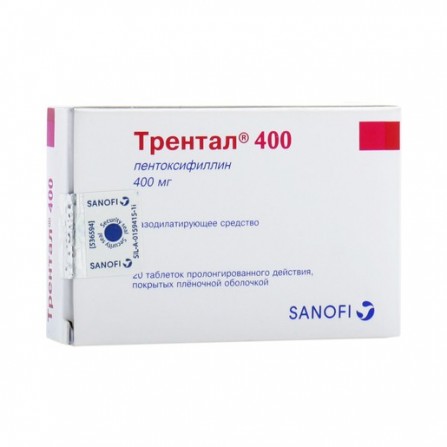Trental coated pills prolonged 400mg N20
Condition: New product
1000 Items
Rating:
Be the first to write a review!

More info
Active ingredients
Pentoxifylline
Release form
Pills
Composition
Pentoxifylline active substance 400 mg; excipients: core: hypromellose 2200 - 0.12000 g, povidone 40 - 0.01650 g, talc - 0.01050 g, magnesium stearate - 0.00300 g; casing: sepifilm 752 white (hypromellose - 35.0% -45.0%. Microcrystalline cellulose - 27.0% -37.0%, macrogol stearate - 6.0% -10.0%. titanium dioxide - 18.0% - 22.0%) - 0.01500 g, dimethicone emulsion - 0.000075 g, macrogol 6000 - 0.000175 g;
Pharmacological effect
Vasodilator, improves microcirculation, normalizes the rheological properties of blood;
Pharmacokinetics
After oral administration, pentoxifylline is rapidly and almost completely absorbed .; Pentoxifylline is metabolized after almost complete absorption. The absolute bioavailability of the original substance is (19 ± 13)%. The main active metabolite of 1- (5-hydroxyhexyl) -3,7-dimethylxanthine (metabolite-1) has a concentration in the blood plasma that is 2 times higher than the initial concentration of pentoxifylline .; T1 / 2 of pentoxifylline after oral administration is 1.6 hours; Pentoxifylline is completely metabolized, more than 90% is excreted through the kidneys in the form of unconjugated water-soluble metabolites. Removal of metabolites is delayed in patients with impaired renal function .; In patients with impaired T1 / 2 liver function, pentoxifylline is prolonged and absolute bioavailability increases. ;
Indications
Peripheral circulation disorders of atherosclerotic genesis (for example, intermittent claudication, diabetic angiopathy), trophic disorders (for example, trophic ulcer of the leg, gangrene); cerebral circulatory disorders (consequences of cerebral atherosclerosis, such as impaired concentration, dizziness, memory loss), ischemic and post-stroke conditions; circulatory disorders in the retina and choroid; otosclerosis, degenerative changes on the background of the pathology of the vessels of the inner ear and hearing loss .;
Contraindications
Hypersensitivity to pentoxifylline, other methylxanthines or to any of the components of the drug; massive bleeding, extensive hemorrhages in the retina, bleeding in the brain; acute myocardial infarction; pregnancy; breastfeeding period; children up to 18 years old .; WITHcaution: severe cardiac arrhythmias (risk of worsening arrhythmias); hypotension (risk of further lowering blood pressure); chronic heart failure; peptic ulcer and duodenal ulcer; impaired renal function (Cl creatinine below 30 ml / min) (risk of accumulation and an increased risk of side effects); severe abnormal liver function (risk of accumulation and increased risk of side effects); after recent surgery; increased tendency to bleeding, for example, as a result of the use of anticoagulants or in case of disturbances in the blood coagulation system (risk of more severe bleeding) .;
Use during pregnancy and lactation
Contraindicated in pregnancy. At the time of treatment should stop breastfeeding;
Dosage and administration
The dosage is set by the doctor in accordance with the individual characteristics of the patient .; Inside, swallowing whole, during or immediately after a meal, drinking plenty of water .; The usual dose - 1 tab. Trental 400 mg 2-3 times a day .; The maximum daily dose is 1200 mg. In patients with impaired renal function (Cl creatinine <30 ml / min), the dosage can be reduced to 1-2 pills. per day. ;
Side effects
In cases where Trental is used in large doses, the following side effects may sometimes occur. Nervous system disorders: headache, dizziness, anxiety, sleep disturbances, convulsions .; On the part of the skin and subcutaneous fat: flushing of the skin of the face, flushing of the face and upper chest, edema, increased fragility of the nails .; On the part of the digestive system: xerostomia, anorexia, intestinal atony .; Since the cardiovascular system: tachycardia, arrhythmia, cardialgia, progression of angina, decrease in blood pressure .; On the part of the hemostasis system and the blood-forming organs: leukopenia, thrombocytopenia; pancytopenia, bleeding from blood vessels of the skin, mucous membranes, stomach, intestines, hypofibrinogenemia .; From the senses: visual impairment, scotoma .; Allergic reactions: itching, skin flushing, urticaria, angioedema, anaphylactic shock. ; Very rarely, there are cases of aseptic meningitis, intrahepatic cholestasis, and an increase in the activity of “hepatic” transaminases, ALP; On the part of the digestive system: a feeling of pressure and overflow in the stomach, nausea, vomiting, diarrhea;
Overdose
Symptoms: dizziness, urge to vomit, falling blood pressure, tachycardia, arrhythmia, redness of the skin, loss of consciousness, chills, areflexia, tonic-clonic seizures .; Treatment: symptomatic, special attention should be directed to maintaining blood pressure and respiratory function. Convulsive seizures are relieved by administering diazepam .; When the first signs of overdose appear (excessive sweating, nausea, cyanosis), the drug is immediately stopped. Provide a lower position of the head and upper torso. Monitor the free airway.
Interaction with other drugs
Pentoxifylline is able to enhance the effect of blood pressure reducing agents (ACE inhibitors, nitrates) .; Pentoxifylline may enhance the effect of drugs affecting the blood coagulation system (indirect and direct anticoagulants, thrombolytics), antibiotics (including cephalosporins) .; Cimetidine increases the concentration of pentoxifylline in plasma (the risk of side effects) .; Co-administration with other xanthines can lead to excessive nervous excitement .; The hypoglycemic effect of insulin or oral antidiabetic agents can be enhanced by taking pentoxifylline (an increased risk of hypoglycemia). Strict monitoring of these patients is required .; In some patients, simultaneous administration of pentoxifylline and theophylline may lead to an increase in theophylline levels. This can lead to an increase or increase in side effects associated with theophylline;
special instructions
Treatment should be under the control of blood pressure .; In diabetic patients taking hypoglycemic agents, the administration of large doses may cause severe hypoglycemia (dose adjustment is required) .; When administered simultaneously with anticoagulants, it is necessary to carefully monitor blood coagulation parameters .; Patients who have recently undergone surgery require systematic monitoring of hemoglobin and hematocrit levels .; The dose should be reduced in patients with low and unstable blood pressure .; Older people may need to reduce the dose (increased bioavailability and reduced rate of excretion) .; The safety and efficacy of pentoxifylline in children is not well understood .; Smoking may reduce the therapeutic efficacy of the drug .;




